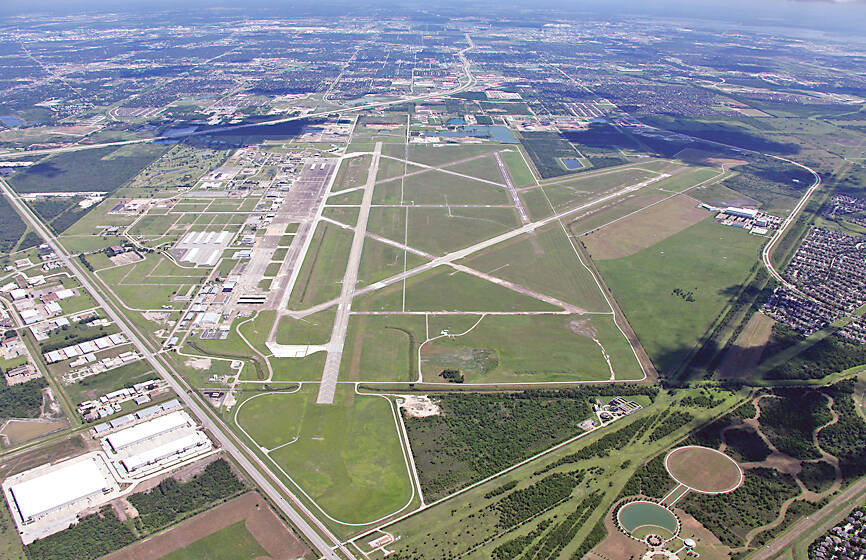Houston First Corp, which manages city-owned properties for Houston, Texas, yesterday said it had contacted the government over the feasibility of introducing a spaceport to Taiwan.
The US has been developing spaceport technology and seeking opportunities to commercialize it and build an industry.
The Houston Spaceport at Ellington Airport is a federally licensed commercial facility for launching and landing suborbital vehicles. It is also a hub for commercial aerospace and aviation companies, as well as a science park for academic, government and private research and development, with tenants such as NASA and Axiom Space.

Photo courtesy of Houston Airport System
Houston First said it contacted Taiwan because it is indispensable to research and development for US companies.
Suborbital commercial spaceflight can reduce the 13-to-16-hour flight from Houston to Taiwan Taoyuan International Airport to two-and-a-half hours, it said, adding that it had exchanged ideas about spaceport applications with government agencies in charge of technology and the American Institute in Taiwan.
The government is still reviewing the information and no plans for a spaceport have been initiated, it said.
Suborbital flight from a spaceport involves an aircraft taking off from a runway carrying a spacecraft, which would detach to fly to an altitude that is considered space, a Houston City Government official said.
The spacecraft would then adjust toward its destination before re-entering the atmosphere in freefall and flying to land at the destination airport, they said.
A spaceport requires appropriate airport facilities, an air traffic control system, aircraft manufacturing capabilities and logistical support, they said.
That includes sufficient weight-bearing capacity of airport runways and space-based communications, the official said.
Based on current technology, spacecraft are launched to conduct experiments and would first be used to transport goods, as the problem of significant drag force on people riding in such a craft must be resolved to carry passengers, they said.
A source with knowledge of the matter said that other US authorities have informally explored the idea with the Taiwan Space Agency at international events.
Given the launch and landing speeds, cargo delivery is more feasible than transporting passengers without training, they said.
Although the cost of suborbital flight would initially be high, it could be lowered if a common and reusable vehicle is developed, the source said.
Earlier this year, the National Science and Technology Council announced it had chosen Jiupeng Village (九棚) in Pingtung County’s Manjhou Township (滿州) as Taiwan’s national space mission launch site.
Although the site’s current operations focus on launching spacecraft, it has the potential to be expanded into a spaceport, the source said.

Nipah virus infection is to be officially listed as a category 5 notifiable infectious disease in Taiwan in March, while clinical treatment guidelines are being formulated, the Centers for Disease Control (CDC) said yesterday. With Nipah infections being reported in other countries and considering its relatively high fatality rate, the centers on Jan. 16 announced that it would be listed as a notifiable infectious disease to bolster the nation’s systematic early warning system and increase public awareness, the CDC said. Bangladesh reported four fatal cases last year in separate districts, with three linked to raw date palm sap consumption, CDC Epidemic Intelligence

The manufacture of the remaining 28 M1A2T Abrams tanks Taiwan purchased from the US has recently been completed, and they are expected to be delivered within the next one to two months, a source said yesterday. The Ministry of National Defense is arranging cargo ships to transport the tanks to Taiwan as soon as possible, said the source, who is familiar with the matter. The estimated arrival time ranges from late this month to early next month, the source said. The 28 Abrams tanks make up the third and final batch of a total of 108 tanks, valued at about NT$40.5 billion

Two Taiwanese prosecutors were questioned by Chinese security personnel at their hotel during a trip to China’s Henan Province this month, the Mainland Affairs Council (MAC) said yesterday. The officers had personal information on the prosecutors, including “when they were assigned to their posts, their work locations and job titles,” MAC Deputy Minister and spokesman Liang Wen-chieh (梁文傑) said. On top of asking about their agencies and positions, the officers also questioned the prosecutors about the Cross-Strait Joint Crime-Fighting and Judicial Mutual Assistance Agreement, a pact that serves as the framework for Taiwan-China cooperation on combating crime and providing judicial assistance, Liang

Reports of Taiwanese going missing, being detained or interrogated, or having their personal liberties restricted in China increased about fourfold annually last year, the Mainland Affairs Council (MAC) said yesterday. Last year, 221 Taiwanese who traveled to China were reported missing, were detained and interrogated, or otherwise had their personal freedom restricted, up from 55 the previous year, the council said. Reopening group tours to China would be risky, as it would leave travelers with no way to seek help through official channels after Beijing shut down dialogue between the associations tasked with handling cross-strait tourism, the MAC said. Taipei’s Taiwan Strait Tourism